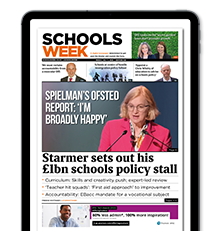The proportion of poorer pupils attending grammar schools has increased by less than 1 percentage point in four years, despite extra funding and an agreement with government aimed at making them more inclusive.
Ministers even admitted some selective schools had seen a decline in inclusivity, and urged leaders “to challenge themselves to do more”.
A Department for Education evaluation found just 7.9 per cent of children in England’s 163 grammar schools in 2021-22 were eligible for pupil premium funding, up from 7.2 per cent in 2017-18.
All schools need to challenge themselves to do more
The report examines the impact of a memorandum of understanding between the DfE and Grammar School Heads’ Association (GSHA), in place between 2018 and 2022.
The DfE said the “fact that the number of disadvantaged children at grammar schools remains low in the face of interventions to increase their numbers shows what a complex issue this is to resolve”.
Achieving inclusion would require “multiple interventions”, they said, and “all schools, especially those which have made no progress or very little progress in admitting greater numbers of disadvantaged children, need to challenge themselves to do more”.

Alongside the MoU covering 152 grammar schools, the DfE also handed 22 schools £64 million in expansion cash in exchange for efforts to boost inclusion.
Dr Nuala Burgess, chair of campaign group Comprehensive Future, said the 0.7 per cent rise in four years was a “shocking figure”.
“Grammar school heads should be ashamed. They make a very big deal about their schools being a force for social mobility. They are nothing of the sort. It looks like business as usual.”
Schools prioritise poorer pupils, but cap numbers
The DfE said the number of selective schools offering a level of priority to disadvantaged children increased from 63 in 2017, to 136 in 2022.
Of 152 members of GSHA, 104 now prioritise children eligible for free school meals or the pupil premium for admission, after looked-after and previously-looked-after children, who have to be first by law.
However, of those, 42 “cap the numbers of disadvantaged children to be admitted under this priority criterion”. Some schools also lowered their pass mark for disadvantaged children.
The DfE pointed out that “only high-ability pupils who meet the required standard in a selection test are eligible for admission to grammar schools and, like their non-pupil premium peers, not all pupil premium children will meet the required standard”.
They said the Covid-19 pandemic had “understandably, been a challenge for schools in undertaking outreach activity”, but added there were “many good examples” of work by schools.

Dr Mark Fenton, chief executive of GSHA, said schools had been “experimenting with different ways of adjusting their admissions policies to widen access”.
As part of a new MoU, the organisation will be “encouraging governing bodies to take a fresh look at their admissions policies in light of experience from across the sector.”
But he said it was “encouraging” that the overall number of poorer children in grammar schools had “continued to rise” despite a drop in attainment of disadvantaged primary pupils.







Your thoughts